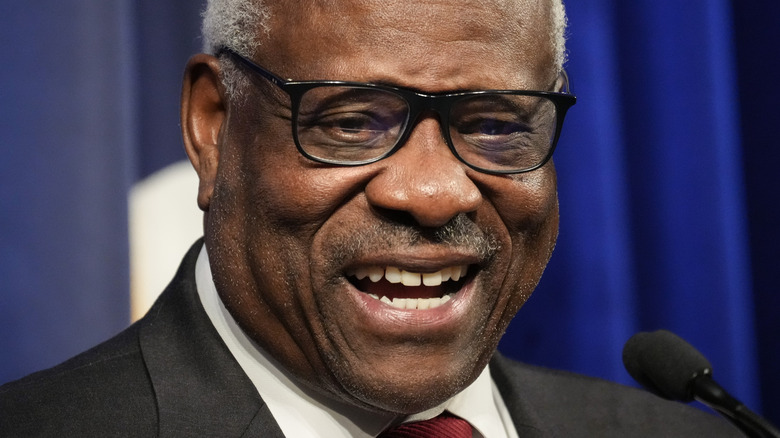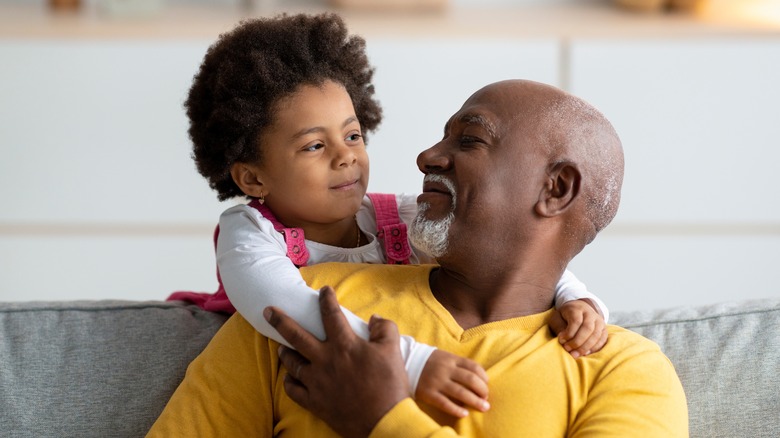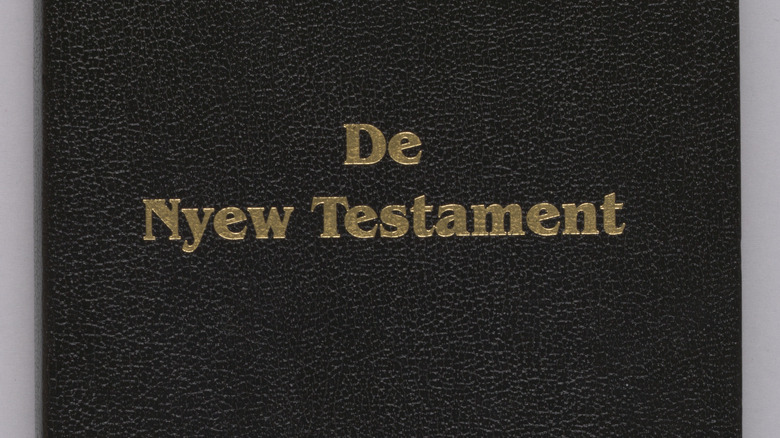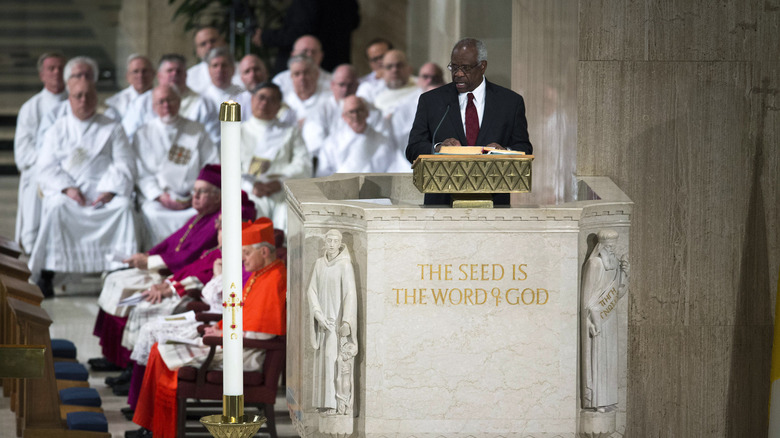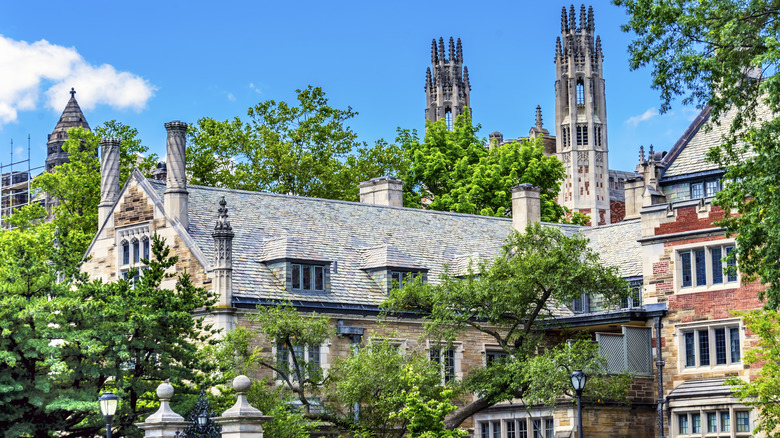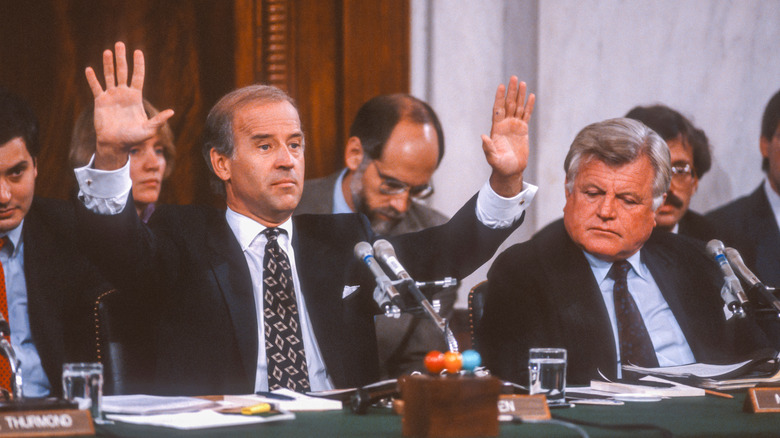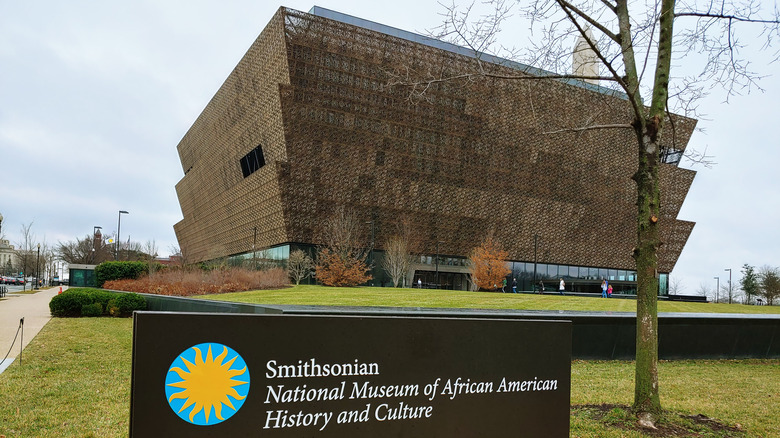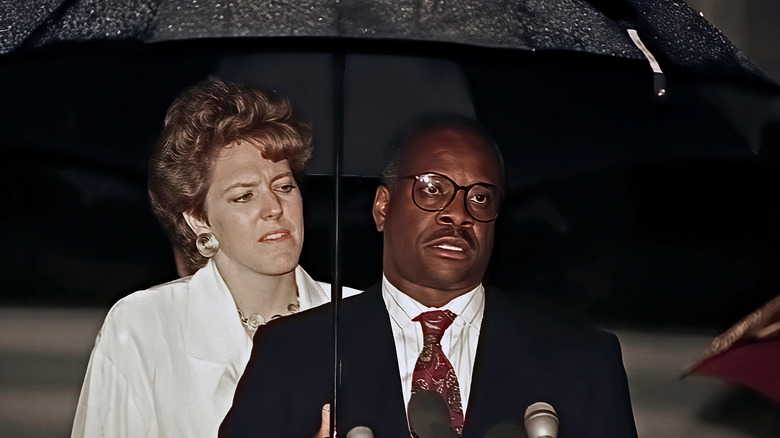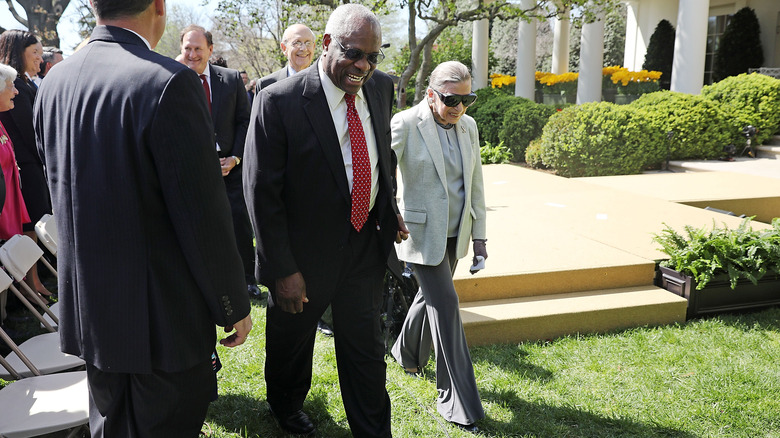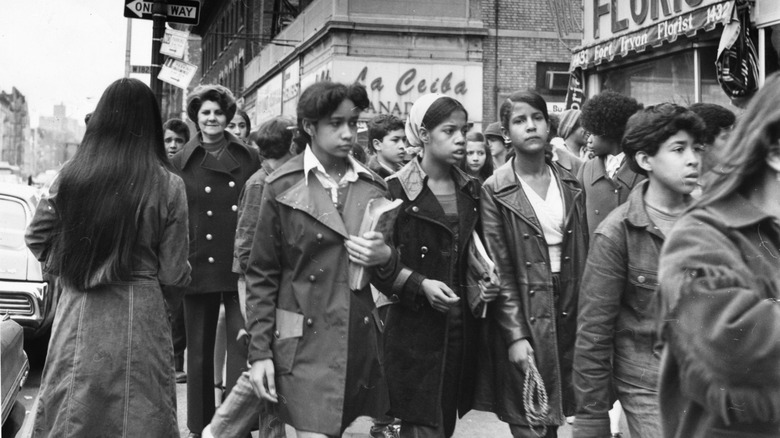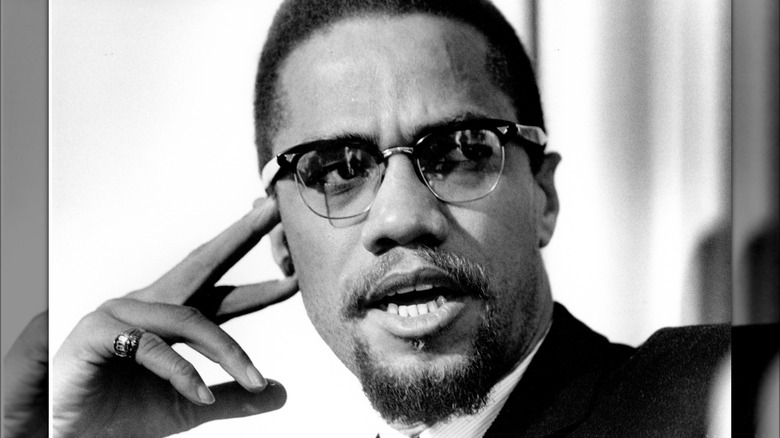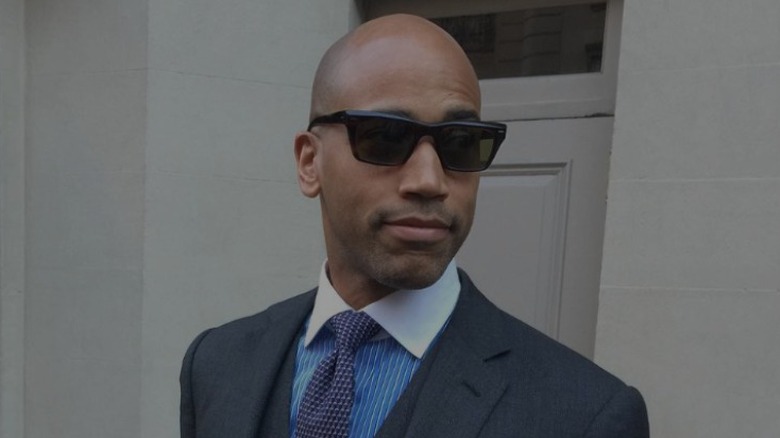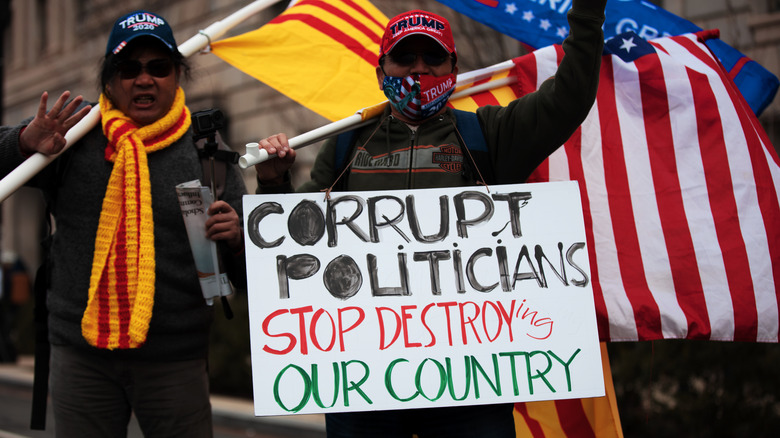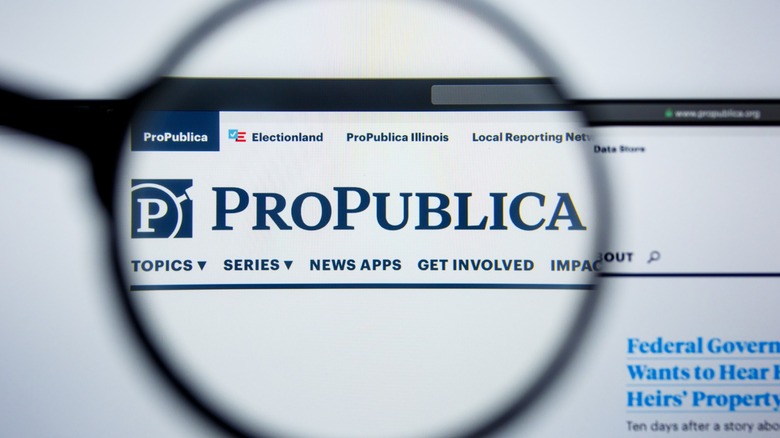Clarence Thomas: Details About One Of The Longest Serving Supreme Court Justices
In 2015, ThinkProgress ranked Clarence Thomas as America's fifth-worst SCOTUS justice in history due to his opposition to government regulation in business. Thomas has also had no problem ignoring judicial precedent if he felt it was unconstitutional. And his strict originalism and adherence to what he feels are the original letter and intent of the Constitution is rather old school. All of these have made him a figure of revulsion and love among the American left and right, respectively. But Clarence Thomas is not particularly well understood, and neither are the ideological underpinnings of his rulings.
Thomas' early life informs much of his judicial work. He went from a one-parent poor, coastal Georgia home to the vaunted halls of Yale University. He has developed his views through experiences with Black Power, Catholicism, and a unique life. All of this has produced a judge that defies conventional political labels. But he has also had his share of unignorable problems ranging from allegations of sexual harassment to a sordid personal life in the 1980s to his connections to January 6th. Here is the untold truth of Justice Clarence Thomas.
His grandfather was his inspiration
Clarence Thomas' story is – to use a cliche – as American as apple pie. Thomas was born to a poor family in coastal Georgia. According to a story published in the Tampa Bay Times, his circumstances were not easy. His father abandoned the family when he was young, leaving Thomas' mother to raise them alone on a minimum wage job. But despite the circumstances, Thomas never gave up, riding the American Dream to rise as high as talent would take him. And as far as he is concerned, it was all thanks to his grandfather Myers Anderson – "the greatest man [he'd] ever known."
In an interview with Explorations on Black Leadership, Thomas discussed his grandfather's legacy. The SCOTUS justice noted that despite being an illiterate sharecropper, he wanted his grandson to go far. So apart from teaching Thomas about the value of hard work and perseverance, he also took an active role in furthering his grandson's education. Seeing that Thomas needed better opportunities than those he was getting in his mother's town, Anderson moved Thomas to Savannah and enrolled him in two Catholic schools that put the future justice on the road to the Supreme Court. Thanks to his grandfather's initiative, Thomas went on to attend the College of the Holy Cross and Yale Law even under some of the toughest circumstances that faced African Americans in the Jim Crow South.
English is not his first language
American political figures are not particularly known for speaking foreign languages. Politicians on both sides have been mocked over their butchering of even the simplest Spanish phrases. But Clarence Thomas can claim to be multilingual, as he did not grow up speaking English at home.
Thomas' family, like many African Americans in the area he grew up, spoke an English-based Creole language called Gullah. According to The University of Hawaii Linguistics, Creole languages arise when pidgins that develop from natural contact between two or more languages gain enough traction to formalize into a new language. Usually, vocabulary is drawn from one language (a.k.a. the lexifier) and the grammar is drawn from the other. Gullah, per Yale University, arose among enslaved people, mostly from Sierra Leone, who developed their unique tongue working on plantations on islands off the coast of the southern United States. As expected, English is the dominant lexifier, but West African grammatical structures underlie the syntax.
This fact about Thomas is virtually unknown because he never speaks it publicly. According to U.S. News, Thomas grew up with a "geechee" (a slur for Gullah speakers) accent, which was considered a mark of poor education. As a result, he was embarrassed about speaking Gullah. He did everything to erase his accent and this might explain why he never has spoken it publicly. It might also just be something that is confined to the family sphere.
Clarence Thomas had a frayed relationship with the Catholic Church
Clarence Thomas, unlike the majority of African Americans, grew up in a Catholic household. In a talk at Notre Dame (via Aleteia), he added that his relationship with his faith had sometimes been rocky. According to Thomas himself, he always loved the Catholic Church as a child, especially for its emphasis that all people were created in God's image to love (a.k.a. a child of God), serve, and be happy with God in the afterlife.
Thomas resolved to become a priest and did his last two years of high school at St. John Vianney Seminary. But because the Catholic Church had not taken a hard line against Jim Crow, he became disenchanted with the Church and decided to attend college rather than become ordained. He then turned to secular ideologies, including — as he later termed them — "radical ideologies such as Black Power" in his search for direction and identity.
Ultimately, Thomas claimed to have realized that race-based ideologies were self-defeating because they went against the Catholic conception of all people as God's creation. His favorite teachers (all nuns) and his grandparents had taught him this crucial lesson, and he felt that secular ideologies were never going to help him live by this standard. Thus, he gradually returned to Catholicism.
He has been accused of hypocrisy
Clarence Thomas generated controversy over opposition to policies such as affirmative action. Officially created under the Kennedy Administration (via the University of Rhode Island) to prevent racial discrimination in hiring, the policy has proved a lightning rod in the judicial system, where it has been challenged as discriminatory against whites and Asians. For Thomas, however, his opposition is based on "soft bigotry," which he argues underpins the policy.
Per the Yale Daily News, Thomas complained of isolation from his fellow students, who assumed (he thought) that was unqualified and only able to get into Yale due to affirmative action. Per Business Insider, Thomas felt the attitude extended to his job search, as employers refused to take him seriously. His interviewers again assumed him to be an unqualified candidate that had ridden affirmative action to success. He later recalled that this "soft" racism was the domain of "paternalistic big city whites," a more insidious form of racism – Thomas believed – than the up-front racism of the Jim Crow South.
Thomas' statements have generated debates over affirmative action and over the justice's own educational history. As early as 1991, the Black Scholar ran a piece criticizing Thomas' nomination on the grounds of his poor record. But it also accused him of hypocrisy. The author Karen Wanza claimed that Thomas was actually one of the biggest beneficiaries of affirmative action and that it would be hypocritical of him to oppose it.
Clarence Thomas clashed with Joe Biden in 1991
Anticipating an imminent Supreme Court challenge against Roe v. Wade, the Biden Administration has issued a statement promising to defend Roe, setting Clarence Thomas, who is likely to vote to strike down Roe, against the president. But it would not be the first time the two butted heads. Joe Biden opposed Thomas' nomination to the Supreme Court in 1991.
In the documentary "Created Equal," Thomas recalled that Biden had questioned him about the role of Natural Law in his interpretation of the Constitution. Thomas claimed later that he had no idea what Biden was talking about, but sat there pretending to listen because he had to. According to Reason, Thomas had allegedly endorsed two contradictory views on judicial activism in relation to the Constitution. As it turned out, Biden had omitted Thomas' explanation that only endorsed one view — the one that condemned judicial activism.
This small incident, however, was dwarfed by charges toward the end of the hearings. A colleague named Anita Hill (via PBS NewsHour) accused Thomas of making graphic and sexually inappropriate remarks to her. He denied all accusations, calling the incident a "high-tech lynching" targeted against him because he was an independently-minded Black man. Anita Hill, meanwhile, has become a Brandeis professor and per ABC, has stood by her claims, referring to herself as a "crusader" for the victims of sexual harassment and assault. Biden later apologized to Anita Hill for "the treatment she received" from the Senate, but she did not accept the apology.
He clashed with the African American History Museum too
Criticism of Clarence Thomas' views and the Anita Hill scandal have dogged the justice as recently as 2017, when supporters accused the National Museum of African American History in Washington, D.C. of excluding him from their exhibits. In an op-ed published in The Hill by Georgia representative Earl Carter, the congressman decried the museum's omission of the justice from its hall of important African American leaders as the result of political bias.
For context, Law.com notes that Thomas was only the Supreme Court's second African-American judge after Thurgood Marshall. Thus, it made sense, as Carter noted, that Thomas – regardless of his personal views – deserved a place in the museum. After all, he had overcome poverty, racism, and legal discrimination to reach one of the highest offices in the U.S. government. Instead, the museum only made a one-line mention of Thomas in reference to the Anita Hill scandal.
After congressional Republicans protested the museum's omission on the grounds of political bias, it decided to include Thomas in 2017. It is unclear, however, if Thomas was ever aware of the problem in the first place, since the museum had no idea if he had ever attempted to contact them or cooperate in the design of the exhibit.
Former lovers claimed he was not quite as straight edge as he seemed
Clarence Thomas has the reputation of a stern, laconic judge who takes his religion seriously. But among the Anita Hill accusations (via PBS NewsHour) were graphic claims that Thomas was into pornography and initiated lewd sexual discussions with women who caught his eye. Thomas denied that he had ever said any of these things, but a 2016 memoir by an ex-girlfriend of his suggests that, regardless of the veracity of the harassment accusations, there may have been some truth to the other claims.
First, some background. Clarence Thomas, per the Market Realist, married his high school sweetheart Kathy Grace Ambush in 1971. After one child, they divorced in 1984. Thomas, meanwhile, had begun a relationship with prosecutor Lillian McEwen in 1981 while he and his wife were separated. McEwen wrote a tell-all expose of the intimate details of their relationship.
According to the New York Post, McEwen was smitten with Thomas, whom she found seductive and romantic. But contrary to the stern image Thomas projects, she claimed that he loved to binge drink while dancing to R&B and — most sensationally — take part in threesomes, which was something that Anita Hill mentioned in her testimony, too. Now, it is unclear whether any of this is true. While Thomas does not appear to have commented on the book, McEwen has also never been sued over it. But the book certainly paints the justice in a truly untold light.
Clarence Thomas was friends with Ruth Bader Ginsburg
Supreme court justices often seem to get along. According to USA Today, ideological rivals on the bench Antonin Scalia and Ruth Bader Ginsburg were "supreme friends" that ate, talked, and even traveled together to India. Thomas also had a close friendship with the late liberal justice, who according to Politico, was famous for her legendary banter.
In his tribute to Ginsburg, Thomas noted that she was known as "Rapid Ruth" among the other justices and staff. She was fast in reading, writing, and responding to opinions and could always be relied upon to get things done early. To avoid risking her "wrath," the other justices would work themselves twice as hard to ensure that opinions were out so she would not be kept waiting. Anyone that was "late" (a.k.a. not early) got humorously reprimanded.
Now, such a friendship might not be expected among regular people in today's polarized climate. But Thomas claimed that ideology never got in the way – despite the fact that he and Ginsburg clashed more than any other pair of justices over Supreme Court decisions. Since, however, Thomas claimed that Ginsburg placed respect and civility over everything else, they became friends and served on the court together for over 25 years.
He opposed aspects of school desegregation
Missouri v. Jenkins III was a battle over a state's obligation to desegregate public schools. The primary complaint accused Missouri of failing to desegregate its public school districts in part by allowing the existence of several districts that were overwhelmingly Black. The Australasian Journal of American Studies noted that previous attempts at integration failed because white parents refused to send their children to inner-city schools. The state – the complaint alleged – had not done enough to counter these trends.
SCOTUS ruled in favor of Missouri (via Loyola Chicago Journal of Law), with Thomas joining the majority. The justice argued that while state-enforced segregation harmed children, segregated schools in the absence of government mandate likely reflected voluntary housing choices. While school de-segregationists were not happy, the Black community in at least one Kansas City district applauded the decision. These parents didn't want endless court battles over busing that simply moved students around, they wanted the time, money, and energy used to improve existing schools.
Thomas had a similar view. According to Ed Week, Thomas opposed desegregation on the grounds that it implied two things. First, he felt it implied that a school was inferior because it was predominantly Black. Noting that integration had not helped achievement, he criticized the implication that Black children could only excel academically in the presence of whites, which Thomas likely found to be "soft" racism of the type he experienced during his career.
His conservatism originated in Malcolm X's Black nationalism
According to the Wall Street Journal, Jason Riley decried Clarence Thomas' political opponents attacking him with racist epithets such as "Uncle Clarence" (a play on "Uncle Tom") or a "sellout" for his constitutionalist rulings. Thomas' views are disliked among sections of the Beltway elite, but few on either side understand their origins. It is likely that Thomas sees himself as one of Black empowerment's biggest supporters. He just does not want the U.S. government involved.
According to Notre Dame, Thomas' rulings and views are best understood through his past political influences. Thomas' rulings appear to reflect the philosophy of Malcolm X. This firebrand activist argued that Blacks could surmount racism in America by building up their own communities through education, entrepreneurship, and strong families, and supporting each other by buying and hiring Black, thus eliminating the need for any dependence on a racist government. Otherwise, Malcolm X argued, African Americans would become a "mentally-dead political football" in the hands of "liberal whites."
This is the attitude that seems to permeate Thomas' rulings – even though he renounced Black nationalism well before his appointment to the Supreme Court (via Aleteia). Thomas' rejection of affirmative action is based on the idea that the policy tokenizes Blacks. His ruling against desegregation was grounded in objections to the implication that majority-Black schools were inferior to those with more white students. Thus, in a NY Times piece, journalist Corey Robin argued that Thomas is representing the interests of Black America. He just sees them from a completely different standpoint.
You might have seen his son on your favorite shows
Clarence Thomas's first marriage to Kelly Grace Ambush, per Ed Week, produced a single son named Jamal. Now, Jamal Thomas is a virtual unknown in political circles. He keeps a low profile, few have heard of him, and no one would recognize him in Washington, D.C. But it is very likely fans of popular television shows have seen the younger Thomas on a few occasions – even if they did not recognize him.
According to his IMDb profile, Jamal Thomas has appeared in a number of roles in popular shows, ranging from the medical drama "Grey's Anatomy" – where he played Larry the Paramedic in season 2 – to "Law and Order: SVU" and "FBI: Most Wanted." But apart from this, there seems to be virtually nothing out there about the actor. Perhaps because of his father's name and magnetism for controversy, he prefers to avoid the limelight and focus on his career.
Clarence Thomas is at the center of Jan. 6th-related issues
Clarence Thomas, never a stranger to controversy, has become embroiled in a scandal regarding the January 6th Capitol riot and the 2020 presidential election. The justice, per the BBC, has been crystal-clear in his belief that the election of Joe Biden was fraudulent. His wife Ginni Thomas holds the same view before between Election Day and January 6. As well as attending the rally before the riot (via Vanity Fair), in the days and weeks before, she sent a series of text messages to Trump's chief of staff Mark Meadows urging him not to concede the election.
The revelation of these texts ignited a firestorm of controversy regarding Clarence Thomas' impartiality and conflicts of interest. Opponents have accused Ginni of influencing her husband's judicial rulings in favor of Republican platforms, making Justice Thomas incapable of rendering objective judgments in cases involving election fraud (via CNN) or the January 6th defendants and their lawyers. Thus, outlets such as NPR have called on Thomas to recuse himself from these cases.
Others, such as the WSJ have argued that Thomas has no reason to recuse himself. Americans are generally split right down the middle on the issue. A Quinnipiac poll (via CNN) found that 52% of Americans want Thomas to recuse, while the rest are either opposed or unsure. As the Brookings Institute noted, he has so far refused, and knowing his independent streak, it is unlikely he will.
The ProPublica Report
On April 6, 2023, ProPublica released a bombshell report on Justice Clarence Thomas, which noted that he had been on the receiving end of large amounts of benefaction from Republican activist and megadonor Harlan Crow. This included visiting Crow's private resorts and taking cruises on his luxury superyacht. On some of these vacations, Thomas would be rubbing elbows with other Republican donors and with leaders of conservative think tanks. Justice Thomas did not report any of these trips on his financial disclosure forms, which prompted scrutiny and ethics concerns due to Thomas' position and Crow's activism.
These trips were in stark contrast to the modest and humble lifestyle that Thomas had previously presented in interviews, where he would wax eloquent about his preference to stay in Walmart parking lots in his RV among common people. Yet, some of the reported vacations with Crow would have cost more than $500,000 if Thomas had paid for them himself.
In response, Crow admitted he had extended hospitality to Justice Thomas, but unequivocally stated that there was never any intent to influence him on any judicial cases and that the Thomas' had never asked for any of the gifts. In his response, Justice Thomas acknowledged the vacations but stated that after seeking counsel from numerous sources he did not feel he legally needed to disclose the trips on his financial disclosures. This is due to the Supreme Court's ethics disclosures, which allow exemptions for "personal hospitality" gifts.
